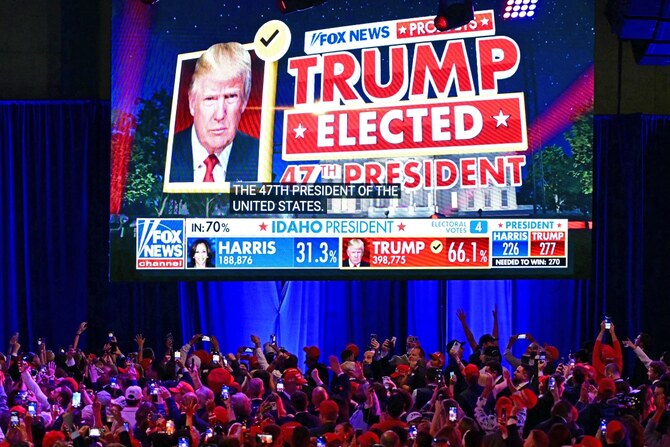DUBAI: World leaders have started offering their congratulations to Donald Trump following his victory in the US presidential election on Wednesday.
Saudi Arabia’s King Salman sent a cable of congratulations to Trump following his win. He wished Trump success in his endeavors, and the American people further progress and prosperity.
The Kingdom’s Crown Prince Mohammed bin Salman also sent a cable of congratulations to Donald Trump, expressing his best wishes and a successful tenure.
Meanwhile, Sheikh Mohamed bin Zayed Al-Nahyan, President of the United Arab Emirates, emphasized the strength and significance of the UAE’s relationship with the United States.
“The UAE and the US are united by an enduring partnership based on shared ambitions for progress,” Sheikh Mohamed bin Zayed Al Nahyan said, expressing optimism about the continued collaboration.
“We look forward to continuing to work with our partners in the US toward a future of opportunity, prosperity, and stability for all,” he added.
Israeli Prime Minister Benjamin Netanyahu welcomed Trump’s return, describing it as “history’s greatest comeback.”
Netanyahu emphasized that Trump’s leadership represented “a new beginning for America and a powerful recommitment to the great alliance between Israel and America.”
The Israeli leader expressed hope that the renewed partnership would strengthen strategic ties and deepen cooperation on key issues.
Highlighting the historic bond between the two nations, Netanyahu was optimistic about what he described as a promising chapter for US-Israel relations.
Ukraine's President Volodymyr Zelenskiy congratulated Trump on his “impressive” victory.
“I appreciate President Trump’s commitment to the ‘peace through strength’ approach in global affairs. This is exactly the principle that can practically bring just peace in Ukraine closer,” Zelenskiy wrote on X.
NATO chief Mark Rutte wrote on X: “I just congratulated Donald Trump on his election as President of the United States. His leadership will again be key to keeping our Alliance strong. I look forward to working with him again to advance peace through strength through NATO.”
Indian Prime Minister Narendra Modi said he was looking forward to working with Trump.
“Heartiest congratulations my friend @realDonaldTrump on your historic election victory,” Modi wrote on X. “As you build on the successes of your previous term, I look forward to renewing our collaboration.”
Iran’s government spokesperson Fatemeh Mohajerani said the livelihood of her nation’s citizens would not be impacted by the US election, according to semi-official Tasnim news agency.
Iran’s currency fell Wednesday to an all-time low following the news that Trump was on the verge of clinching the US presidency again, trading at 703,000 rials to the dollar.
In 2015, at the time of Iran’s nuclear deal with world powers, it was at 32,000 to a dollar.
Trump unilaterally withdrew America from the accord in 2018, sparking years of tensions between the countries that persist today.
Referring to it as an “historic election victory,” Britain’s Prime Minister Keir Starmer said he looked forward to working with Trump.
“From growth and security to innovation and tech, I know the UK-US special relationship will continue to prosper on both sides of the Atlantic for years to come.”
France’s President Emmanuel Macron wrote on X: “Congratulations, President Donald Trump.”
Macron’s message was accompanied by calls from within his administration for Europe to focus on self-reliance in the wake of Trump’s return.
French government spokeswoman Maud Bregeon underscored the need for European independence in key areas.
“We must not ask ourselves what the United States will do, but what Europe is capable of doing,” Bregeon said during an interview with RTL, emphasizing the importance of defense, industrial recovery, and decarbonization efforts.
“We must take charge of our own destiny,” Bregeon added, reflecting a growing sentiment for strategic autonomy in Europe.
Czech Prime Minister Petr Fiala wrote on X: “Our shared goal is to ensure that the relations between our countries remain at the highest level, despite changes in administration, and that we continue to develop them for the benefit of our citizens.”
Italy’s right wing Prime Minister Giorgia Meloni said a Trump victory would strengthen ties between the two countries.
In a post on X, Meloni offered her “most sincere congratulations” to Trump, and said Italy and the US had an “unshakeable alliance.”
“It is a strategic bond, which I am certain we will now strengthen even further,” she said.
Senior Hamas official, Sami Abu Zuhri, called on Trump to avoid the perceived policy missteps of President Joe Biden.
“We urge Trump to learn from Biden’s mistakes,” the official emphasized, referencing dissatisfaction with the Biden administration’s handling of Israel’s war on Gaza.
Abu Zuhri described the Democratic Party’s likely loss as “the natural price” for its leadership’s “criminal stance” toward Gaza.
Highlighting expectations for Trump, he said the former president’s return puts him “to the test” to act on his promises.
























